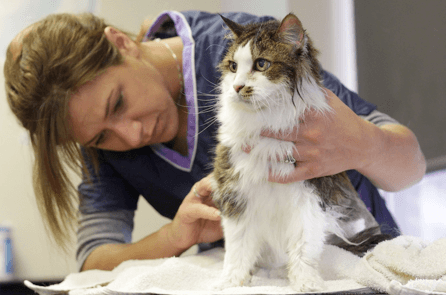If you are an animal health professional, it can be hard to explain to pet owners the cost of their animal’s treatment, even more so if they don’t have pet insurance. This article from finder.com.au may help in educating pet owners about the pros and cons of pet insurance…

EDUCATING PET OWNERS ABOUT THE PROS AND CONS OF PET INSURANCE
No vet enjoys discussing money following a pet emergency, but treatment isn’t free. That can mean an awkward conversation when one of your clients isn’t sure of the best way to pay.
So, how can you educate your customers about the benefits of pet insurance?
Know the facts
There are millions of pet owners in Australia, but only around one in five have pet insurance. Some people feel they don’t need it, while others aren’t ready to commit to the ongoing cost or think they won’t get value for money.
The AVA estimates that pet owners spend around $450 on vet bills every year. If you consider that pet insurance can be purchased for as little as $290 a year, it turns out to be quite cost-effective.
If you’re approached with questions about pet insurance, it’s a good idea to discuss the pros and cons. It helps if you have an understanding about the types of cover available.

Pet insurance policies
Pet insurance policies typically fall into three categories:
- Accident-only cover. Provides cover for unforeseen injuries that occur, such as fights with other dogs or car accidents.
- Accident and illness. Provide protection from accidents, but also any illnesses or diseases that arise. This can include issues such as diabetes and cancer.
- Comprehensive cover. This is the highest level of cover, covering accidents, illness and some regular vet expenses. You can also take out a routine care add-on, which covers ongoing maintenance for your pet, such as grooming, training and prescription diet costs.
Are there any exclusions?
Most policies do have exclusions and restrictions. For example, there are only a handful of pet insurance policies that provide new policies over eight years of age, given that as dogs get older their health declines.
Pet insurance also won’t provide any cover for injuries that occur as the result of abuse, and often they’ll exclude vaccine-preventable illnesses. Some tick treatments aren’t included for this reason.

Factors that influence policy costs
Pet insurance premiums are determined by a range of factors. When it comes to insuring a dog the biggest influencer is breed.
Health issues vary widely between dogs of different sizes, which is one reason why costs fluctuate so much between breeds. Purebred dogs are prone to pre-existing genetic conditions, which is why they cost more to insure. For more information about the costs of insuring a dog, you can check out a dog breed insurance calculator.
Don’t pretend to know all the answers
You don’t have to be the expert. If a pet owner asks you for advice and you aren’t sure of the right answer, it’s better to suggest they do more research themselves rather than pretending to know. Giving them the wrong information could end up costing them money they didn’t need to spend.

Encourage comparison
Pet owners can take out dog, cat and even horse insurance policies online. The benefits of getting cover online is that they can get a good idea of what policies usually cost and then compare their options rather than buying direct from a provider. Those who don’t compare online could be missing out on more competitive pricing so it’s a good idea to encourage it.
Pet insurance remains a decision for the owner, but knowing the basics means you can point your customers in the right direction.
About the author 
Richard Laycock is a pet insurance expert and resident dog lover at finder.com.au, Australia’s most visited comparison website.
More about insurance and your pet’s health:
Does it pay to get pet insurance?
What you need to know about insurance for older pets
Common dog health disorders





Comments are closed.